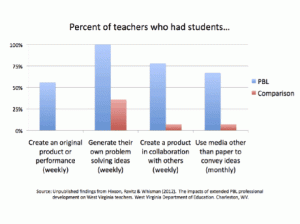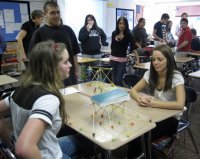Math, PBL and 21st Century Learning for All Students
Considering project-based learning as a way to teach 21st century competencies? Or perhaps you have already used PBL in your schools and want support for your discussions with administrators, parents or board members? In either case, it might be helpful to know about the strong research evidence that PBL, when supported by good professional development, can in turn support the teaching and learning of 21st century skills significantly better than more traditional alternatives.
Sometimes skeptics will argue that for certain subjects (e.g., math) or some types of students (e.g., lower performers) are harder to teach using PBL. They might enjoy this video of students building a house as an example of good teaching -- but not necessarily an example that could or should be followed. Others, such as Paul Lockhart in his Mathematician's Lament, suggest that applying math to real world situations could actually hurt creativity.
Math teachers and teachers of lower-performing students do have unique challenges for teaching 21st century skills. However, research demonstrates those who use PBL are much better able than more traditional teachers to teach and develop these skills.
Here are two more videos showing students using math while conducting projects, working in groups to create original products or presentations.
These provide vivid examples of PBL helping math teachers promote 21st century learning, but how do we know, and how do we convince others that they aren't just anecdotal and isolated examples?
Evidence from West Virginia
Let's look at the data. Research shows these are not isolated cases. We see the evidence in research conducted with teachers in West Virginia. This statewide study included nine PBL math teachers, who received extended professional development, and 14 non-PBL comparison teachers.
- Five out of nine (56%) of the PBL math teachers said students "created an original product or performance to express their ideas" every week, compared to none (0%) of the 14 non-PBL math teachers.
- All (100%) of the PBL math teachers said students "generated their own ideas about how to confront a problem or question" weekly, compared to 36% of the comparison group.
- Math teachers who used PBL reported more student collaboration than others. For example, 78% said students created joint products using contributions from each student weekly, compared to only 7% of comparison teachers.
- Concerning communication technologies, two-thirds (67%) of PBL math teachers said students conveyed their ideas using media other than written papers at least monthly, compared to 7% of other math teachers.

Based on these results, math teachers should feel affirmed in their commitment to pursuing a high quality PBL curriculum as a vehicle for developing and promoting 21st century knowledge and skills.
What about the concern that PBL cannot be used with lower-performing students? Teachers of lower-performing students who used PBL also taught and assessed 21st century skills much more than non-PBL teachers. This was true for teachers of higher-achieving students, too, but they more often taught these skills without PBL as well. This means that PBL may be especially important for lower-achieving students who otherwise get less of a chance to learn these skills.
Are you convinced that PBL can help promote 21st century learning even in math classes and classes with lower-performing students? Based on your experience, would you recommend trying to teach 21st knowledge and skills in these classes using PBL, or trying a different approach?
